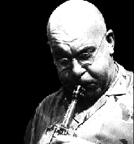looking back - lol coxhill benefit gig
by stephen yarwood
this article first appeared in issue 17 in January 1997
......................................................................................................
Facelift 3 (March 1990) featured an article by Alan Terrill entitled Dave Stewart - the amended story, in which the author states that "National Health continued to exist for a short time after Dave Stewart had quit. Alan Gowen rejoined for a few dates on the continent, but I don't think they played in the UK with this line up."
I can confirm they made at least one UK appearance, on March 16th 1979 at Oxford Polytechnic as part of a benefit for saxophonist Lol Coxhill, who had sustained serious facial injuries in a road accident whilst travelling in the USA. A large portion of his estimated hospital bill was for dental surgery, without which his musical future looked bleak.
The advertised line up was impressive, The Oxford Colleges Big Band, poems and monologues from Ivor Cutler and Phyllis April-King, solo trombone from the uncompromising Paul Rutherford, pianist and British jazz legend Stan Tracey, Steve Miller and friends, and National Health. On the day snow began to fall during the late afternoon and conditions rapidly deteriorated. Stan Tracey phoned in to say he wasn't going to make it, and other artists were inevitably delayed. Things finally got underway over an hour late. This followed dire warnings from the college authorities, no doubt prompted by the presence of the Legalise Cannabis stall in the foyer, that if they caught the slightest whiff of ganja they would pull the plugs.
Ivor Cutler was odd but I doubt if anybody in the audience, including myself, had any idea which musical universe Paul Rutherford inhabited. It wasn't one we understood. We just stood and watched the trombone played as never before.
Steve Miller's entrance was eccentric. Unannounced a scruffy looking figure wandered on stage and sat down at the grand piano. After a little hesitation he played a short piece, stood up, muttered something about "other musicians" and walked off. Steve Miller I presumed. A few minutes later he returned, played for a similar period of time and once again disappeared. Finally, the bemused audience were relieved to see Miller, this time with accompanists, stride back in a much more workmanlike manner and seat himself at the electric piano. Jack Monk on bass and Laurie Allan on drums, were both old sparring partners from the late sixties and early seventies line ups of Delivery and the unrecorded DC and the MB's.
At last we were getting down to serious business as piano began to weave a theme around the slowly building bass and drums. The music was essentially improvisational with all three players responding well to the various ideas ebbing and flowing between them. Obviously Miller's piano, and its various tone changes, provided the core of the sound, but Laurie Allan's effective combination of subtlety and attack provided crucial extra colour. There was even a moment of humour when Alan Gowen appeared from the wings with a dummy keyboard, to enthusiastically, but silently jam with Miller and Co. A most enjoyable set concluded after about an hour to much applause.
I had previously seen National Health at Oxford Poly as opening act on the Steve Hillage Tour in May 1978. It had been a little disappointing as much of Dave Stewart's keyboard work had been lost in the rather muddy mix, and by the time they really got going it was all over. As usual the support act had to settle for a shortened set and no encore. With Dave Stewart's departure they had lost their main composer, and his distinctive keyboard sound. Would National Health whither and die? Certainly not, on this night they were magnificent. In contrast to his predecessor who was mainly an organist, Alan Gowen was a pianist who doubled on synthesiser. His talents on this latter instrument had been much in evidence as a guest player on the first National Health album.
First to be heard was the moody John Greaves composition Squarer for Maud. The Greaves bass was noticeably more up front and harder edged than on record, where he has at times been buried in the mix. The sound crew on the night had got everything right though, the balance was perfect. Next up was Phil Miller's Dreams Wide Awake during which people were actually dancing! This primitive display of uncoordinated body movements, reached its peak during Alan Gowen's synthesised reading of Dave Stewart's gut wrenching organ solo, so graphically described on the Of Queues and Cures sleeve. Phil Miller's guitar was as distinctive as ever, with that familiar fuzz tone in the solos and themes. The old Hatfields number Underdub, a Miller composition, was strangely absent from the set, it would have seemed ideal for this line-up. The whole thing was held together by Pip Pyle, whose tight control over the constantly shifting rhythms complemented the dazzling contributions of his colleagues. In the absence of Dave Stewart compositions quite a lot of the material was unfamiliar, but looking at it objectively, this did not detract from the enjoyment of the occasion. Alan Gowen had enhanced the National Health sound with his own style and personality, and contributed a number of his own compositions, all of a very high standard. The only title which stuck in my mind was TNTFX which appeared on the 1978 Gilgamesh album Another Fine Tune.
Eventually it had to end, enthusiastic calls for an encore went unrewarded as those in authority decided time was up, and on came the house lights. An audience of about 200 had had tremendous value for money, in addition to contributing towards the rehabilitation of Lol Coxhill's musical career.
Stephen's own website, including all his many contributions to Facelift, can be reached here








